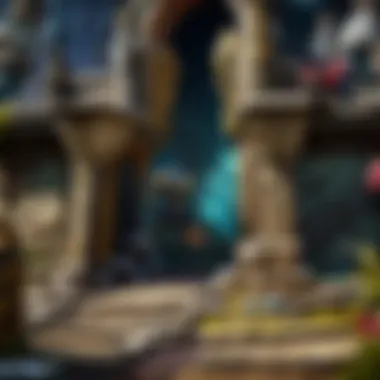Understanding Honor Levels in League of Legends


Intro
In the competitive landscape of League of Legends, the pursuit of greatness isn’t limited to climb the ranks. There’s an invisible gauge that underpins player interactions and team dynamics: the Honor Levels. This system is akin to a hidden currency, with its own tiers that signify a player’s commitment to fostering a positive environment. Understanding how this mechanism works can be invaluable for both novice and seasoned players alike.
The importance of honor cannot be overstated. It’s not just about recognition; it influences gameplay, shapes community interactions, and can make or break a player’s experience. Many might wonder: what exactly are these honor levels? How can they be earned, and what implications do they carry within the game?
To navigate this complicated, yet crucial aspect of League of Legends, we’ll explore the various honor tiers, the ways to accumulate honor, and how this system feeds into the broader ethos of the gaming community. Expect insights that delve deeper than surface-level understanding, revealing the intricacies behind this influencing mechanic.
Let’s embark on a detailed journey through the honor landscape, equipping you with the knowledge to not just play the game but also contribute to a thriving, positive gaming atmosphere.
Overview of the Honor System
In the diverse realm of gaming, the Honor System in League of Legends serves a pivotal role. It's not just about points; it’s about fostering a positive atmosphere within the community. Players often find themselves in heated battles, sometimes leading to frustrations. The Honor System intends to mitigate these, promoting behavior that aligns with teamwork and sportsmanship.
The idea is to recognize and reward players who contribute positively to their matches. Essentially, when a player honors another for exemplary actions, it signals to the broader community what behavior is valued. It’s an acknowledgment that resonates well beyond the individual matches, creating a culture of respect and collaboration.
Historical Context
The Honor System wasn't always a part of League of Legends. Before its introduction, toxicity was rampant, with many players feeling alienated by negative interactions. This environment was counterproductive, leading to players leaving the game out of frustration.
In response to growing concerns, Riot Games implemented the Honor System in 2018. The initial goal was to change the tide, pivoting the focus toward integrity and sportsmanship. They did so by categorizing players into various honor levels, which would help in identifying and rewarding those who extended goodwill in-game.
Purpose of the Honor System
At its core, the Honor System serves multiple purposes. Firstly, it aims to encourage players to exhibit positive behavior. When peers recognize good sportsmanship—whether it's providing support or congratulating teammates—the system reinforces those actions, creating a cycle of positivity.
Secondly, it acts as a barrier against negative behavior. Players in higher honor tiers are less likely to engage in toxic interactions, understanding the implications of their actions on their rank. They become role models in the community, embodying the values that League of Legends wants to promote.
In a nutshell, the Honor System strives to build a sense of community. It highlights the importance of collective achievement over individual accolades. When players honor each other, they’re not just recognizing singular accomplishments; they are weaving a fabric of camaraderie and respect that is essential for the longevity of the game.
"The Honor System transforms individual interactions into a broader dialogue about community standards and expectations within League of Legends."
As players navigate their journeys, understanding the Honor System becomes an essential piece of the puzzle, leading to enriched experiences and a healthier gaming environment.
Honor Level Tiers
In the realm of League of Legends, understanding the Honor Level Tiers is crucial. This system not only tracks player behavior but also encourages positive interactions among gamers. As players ascend through the ranks, they receive a clear indication of their standing, which can influence their overall gaming experience. The tiers serve as benchmarks for both individual players and the broader community, cultivating an environment where respect and commendation reward good sportsmanship. Let’s delve deeper into the distinctive tiers of honor.
Bronze Tier - The Starting Point
Every journey begins somewhere, and for most players, it starts in the Bronze Tier. This level represents the initial phase of the honor system where players are often still finding their feet in the game. At this stage, it’s not uncommon for individuals to face challenges related to communication and teamwork.
Players in Bronze may experience varying degrees of behavior from their teammates. It's a mixed bag, some are eager to learn while others might exhibit tendencies that can lead to frustration in games. Some might even consider this tier a step to understanding how to operate within a team, and a learning curve for future interactions.
It’s important to note that while Bronze players might not have the highest recognition, they still have every opportunity to grow and improve their honor standing by actively engaging positively with others.
Silver Tier - Growing Respect
Upon earning a spot in the Silver Tier, gamers often notice a shift in team dynamics. They might find themselves surrounded by players who have a better grasp of strategies and teamwork. Here, respect begins to be more pronounced, as communication improves significantly compared to the Bronze level.


Players in this tier often start receiving positive acknowledgments, whether in the form of 'Well Played' or 'Thank You' messages after games. This kind of feedback enhances the gaming experience. As players accumulate honor points, it also impacts their matchmaking — they may find more diligently coordinated teams, leading to a more enjoyable game.
Gold Tier - Acknowledgment of Merits
Achieving the Gold Tier is a milestone worth recognizing. This level is often filled with players who consistently make noteworthy contributions to their teams. Behaviors such as offering strategic insights, helping teammates when they’re down, and displaying excellent skill sets all contribute to honor accumulation.
Gold players have reached a point where they can handle stress better and respond constructively to setbacks. The camaraderie within the tier often leads to forming more stable team relationships. High skill combined with a respectable approach makes this level an acknowledgment of one’s merits in the gaming community.
Platinum Tier - Elevated Recognition
Climbing to Platinum is an indication of not just skill but mark of a player role model. At this point, players are often striving for excellence and their conduct exemplifies the values of teamwork and sportsmanship. They exhibit a strong understanding of the game mechanics and are usually more self-aware compared to previous tiers.
Players in Platinum often are seen as go-to teammates, inspiring newer players or those still in the Bronze or Silver tiers. Such players can provide mentorship or guidance during casual matches, promoting a healthier game environment. Their actions cultivate trust, which inherently contributes to a better experience overall.
Diamond Tier - Peak of Honor
The Diamond Tier represents the zenith of honor in League of Legends. Players here are not only skillful but also embody the finest aspects of gaming etiquette. They understand that respect and honor are essential components of the game, leading to an inclusive and welcoming atmosphere.
Within this tier, you'll find players who have mastered their champions and understand the nuances of team synergy. They often possess the ability to motivate others and create strategies that benefit the whole team. A player in Diamond can expect to receive a mix of admirers and challengers, every match being a testimony to their commitment to upholding the highest standards of gameplay.
Their presence in matches plays a pivotal role; while they are competitive, they also encourage an environment where all players can thrive.
Understanding these tiers not only helps players navigate through the League of Legends ecosystem but also influences how they perceive themselves and others in the community. Players are reminded that while skill is important, how one interacts with fellow gamers can have lasting implications.
Earning Honor
The concept of earning honor in League of Legends is pivotal in shaping a positive gaming landscape. It transcends mere gameplay mechanics, extending into the realms of player interaction and community building. For players, honor isn’t just about recognition; it's about cultivating an environment that encourages respect and collaboration in what can otherwise be a competitive arena.
Each player has a role to play in this nuanced system, and understanding how to earn honor can significantly influence overall gameplay experience. The benefits range from personal satisfaction to tangible rewards, impacting both how players see themselves and how they are perceived by their peers. Therefore, knowing the elements of earning honor is crucial for anyone looking to enhance their standing within the game.
Positive Player Behavior
One of the most significant aspects of earning honor is demonstrating positive player behavior. Simply put, players who support and uplift their teammates often find themselves being honored more frequently. This means not only minimizing negative interactions but actively participating in them or perhaps initiating them. It's important to communicate constructively; rather than focusing on mistakes, frame discussions around solutions. Encouragement goes a long way.
Here are a few ways to exemplify positive player behavior in League of Legends:
- Encouragement: A well-timed "good job" or "we can do this!" can change the tide of a game.
- Constructive Feedback: Instead of criticizing poor performance, offer tips that could help your teammates improve.
- Staying Calm Under Pressure: Tensions can rise quickly. Keeping a cool head can prevent explosive interactions.
By embodying these behaviors, you're more likely to earn honor levels that reflect not just skill, but a commitment to a better gaming environment.
Reporting System
The reporting system in League of Legends serves as a double-edged sword. On one hand, it is a valuable tool for maintaining a healthy gaming community. On the other, it can be misused, which brings its own set of challenges.
When players report those who exhibit negative behaviors—like toxicity, trolling, or intentional feeding—they help to uphold standards within the community. These reports can lead to potential consequences for the offending players, scapegoating level accountability. However, it’s vital to ensure that reports are valid. Misuse or abuse of the reporting system not only undermines its effectiveness but can also lead to unwarranted penalties for innocent players.
To summarize, being conscious of the reporting mechanisms is essential. While it's important to safeguard the community from toxicity, we also need to balance that with fair treatment for all players.
Honorable Actions during Gameplay
Honorable actions during gameplay encompass a wide range of behaviors. It's about your decisions when the stakes are high and the pressure is on. Some of these actions are instinctual, while others require conscious effort.


Here are examples that can contribute positively to the honor system:
- Helping Others: Whether through ward placement or sharing knowledge about objectives, support your team.
- Team Play: Prioritize strategies that benefit the team rather than just focusing on personal accomplishments. It's a team effort, after all.
- Sportsmanship: Always respect your opponents and acknowledge good plays, even if it’s a hard-fought loss.
Consequently, these actions lead to a culture where players don't merely compete, but collaborate toward mutual success. Building honor this way fosters relationships and, ultimately, a more enjoyable gaming experience for everyone involved.
"Honor in gaming isn't just a badge of pride; it's a commitment to creating an environment where everyone can thrive."
Earning honor is more than just a game mechanic—it's a collective responsibility that reflects individual performance and community standards.
Consequences of Honor Levels
The impact of Honor Levels in League of Legends extends beyond mere badges of recognition; it shapes player interactions, influences game outcomes, and molds community behavior. Understanding these consequences is essential not just for the casual gamer, but also for seasoned players who wish to navigate the complexities of online gaming culture. By harvesting positive behaviors through this system, players are not only encouraged to improve their conduct during matches but are also recognized for this endeavor, reinforcing a cycle of positivity that benefits everyone involved.
Impact on Matchmaking
One of the most significant consequences of Honor Levels lies in their direct influence on matchmaking. Players with higher honor tiers are often placed into matches with others who exhibit similar behavior. This ideally creates an environment where mutually respectful interactions are the norm rather than the exception. The reasoning behind this is pretty straightforward; when players maintain a higher level of honor, it signals to the system that they are less likely to rage quit, more inclined to communicate effectively, and generally boost the morale of their teammates.
Higher honor levels can also affect the overall quality of the matches. Imagine logging in to a game, filled with players who display respect and courtesy. This smooths the experience considerably, moving the focus away from toxicity and grievances toward actual gameplay strategy. However, this is a double-edged sword. If a player has a flagging honor level due to consistent negative behavior, they may find themselves matched with others of their kind—a match marred with bickering and hostility.
"The honor system acts as a silent referee, guiding players toward amicable interactions or, conversely, into contentious clashes."
In this way, the matchmaking system can serve as both a reward and a punishment, showing the crucial importance of one’s honor status. It amplifies the need for players to maintain not just skills but also decorum, fostering a self-regulating community.
Rewards and Recognition
Honor Levels don’t just influence interactions during games; they also bring tangible benefits to players who achieve higher tiers. The rewards and recognition associated with these levels act as an incentive to uphold positive behavior. For instance, players honored at gold tier and above may receive exclusive rewards such as skins, champion capsules, or even in-game currency that can enhance their overall experience. These are not mere trinkets; they represent a canvas upon which players can show off their commitment to the ethos of League of Legends.
The recognition that comes with an elevated honor level can often lead to greater esteem within player circles. High-ranked players are frequently sought after by teammates and peers. For competitive players, demonstrating a higher honor level can be as important as showcasing one’s rank on the scoreboard. This reputation can allow them to form teams more easily, gain entry into high-level play, and even secure sponsorships.
Moreover, recognition within the community fosters a sense of belonging. When players see their honor being acknowledged, it creates camaraderie—a feeling that together, they’re contributing to a culture that values respect and fair play.
Community Perspective
In the context of League of Legends, the Honor System is not just an individual metric but a mechanism that reflects broader community attitudes and behaviors. Understanding how players perceive and engage with this system is crucial to grasping its significance. Players interact within a complex social fabric formed by shared experiences, competition, and team dynamics. These interactions help to cultivate an environment where cooperative play is encouraged, leading to a healthier gaming community overall.
Player Discussions on Honor
Conversations among players about honor often reveal a spectrum of opinions and insights. Some players view the Honor Levels as a badge of pride, enhancing their reputation and credibility in the gaming world. This recognition can boost a player's confidence and may even influence their performance. Moreover, players frequently discuss how honor reflects a player’s personality and in-game conduct. They often share stories about teammates who either upheld or tarnished this reputation during matches.
"Honor isn't just a color; it’s a player’s reflection, embodying teamwork and sportsmanship!"
However, the discussions can take a critical turn as well. Many players express frustration about the inconsistency of the honor system. Instances of players receiving high honors despite poor behavior can lead to disillusionment with the entire system. These voices indicate that not all players respect or trust the honor rankings, suggesting that improvements may be needed to restore faith in the system. It’s evident that how players discuss honor directly impacts how the system is perceived, illustrating the nuanced relationship between individual behaviors and community standards.
Influence on Team Dynamics
The Honor System plays a pivotal role in team dynamics during gameplay. When players value honor and understand its significance, they are more likely to engage in cooperative behaviors, such as effective communication and strategy alignment. This can create a ripple effect throughout an entire match. Conversely, a lack of honor consciousness can lead to toxicity, aggravating conflicts instead of resolving them.
Moreover, players often adjust their gameplay based on their team’s honor standings. Those with higher honor levels might feel a sense of responsibility to uphold their reputation, positively influencing their teammates’ performance. In contrast, newer or lower-ranked players may feel pressured or alienated when playing with highly honored individuals, which can compromise teamwork.
In summary, the community perspective on the Honor System provides critical insights into how players view and interact with a structured framework meant to encourage positive behavior. These discussions are not simply anecdotal but represent intricate pieces of a larger puzzle, deeply influencing the gaming experience and culture within League of Legends.


Challenges within the Honor System
The Honor System in League of Legends aims to foster a positive gaming experience. However, it faces its share of challenges that can hinder its effectiveness. Understanding these challenges is vital for players, developers, and the community alike. Some challenges bring about the potential for misuse, while others stem from inherent gameplay practices.
Abuse of Reporting Features
One of the most significant issues within the Honor System is the abuse of reporting features. Players sometimes take advantage of the reporting mechanics to retaliate against others, often for reasons unrelated to actual misconduct. This phenomenon, known as "reporting harassment," can undermine the system's intended purpose by falsely labeling honorable players as unworthy of praise.
The abuse often arises in heated matches where frustration runs high. Players may believe they are justified in reporting someone for minor mistakes or misunderstandings, viewing it as a way to "level the playing field." This behavior not only skews the data collected by the developers but can also lead to a chilling effect on honest communication among players. If players start to fear repercussions for regular gameplay errors, they might withdraw from engaging fully, which further deteriorates the gaming experience.
Preventing this requires a robust system to identify patterns of false reporting. Developers need to analyze and refine the algorithms that define behavior metrics. Engaging the community through discussions about fair play and outlining what constitutes valid reporting is essential. Summing it up, abuse of reporting features creates a cycle of negativity that harms everyone involved.
The Impact of Smurfing
Smurfing—when an experienced player creates a new account to play against less skilled opponents—poses another challenge to the Honor System. This practice can contribute to the deterioration of fair competition and skew the Honor levels of both the smurf and the unsuspecting players they face.
When veteran players face novices, it often leads to unbalanced matches, where smurfs dominate the gameplay. As a result, the newbies may experience a demoralizing loss of confidence and a negative perception of the game. The impact extends to honorable behavior recognition as well. Since seasoned players occupy lower honor levels on smurf accounts, their ability to earn honors diminishes, while they may receive unjustified reports from unhappy opponents unlucky enough to be matched against them.
Moreover, smurfing can lead to a divide within the community, instigating disputes over how best to handle these accounts. Here, awareness and education play crucial roles. Players need to understand the implications of smurfing—not just on their gameplay experience, but on the holistic environment of League of Legends.
"Every player actions have a ripple effect on the game's community, negative or positive. All of us share the responsibility to foster an engaging and fair gaming experience."
In summary, while the Honor System has notable aspirations, its success depends significantly on addressing these challenges. Only by actively working to mitigate reporting abuses and the issues created by smurfing can the community ensure a more positive and rewarding experience for everyone.
Future of the Honor System
The potential evolution of the Honor System in League of Legends stands as a vital theme in fostering not only player enjoyment but also a constructive community culture. As game developers listen keenly to player feedback and adapt to changing gaming landscapes, the Honor System must also mirror those shifts. With the perfect balance of analyzing past implementations and innovating with fresh ideas, the future could hold significant improvements.
Potential Revisions and Updates
In contemplating potential revisions, it’s crucial to recognize the changing dynamics of player interaction. The old ways sometimes don’t cut it anymore. Developers may consider bolstering the criteria for honor, making it more challenging to achieve higher levels while rewarding those who display altruism and leadership during match play. Also, daily awards or incentive systems for consistent positive behavior could be introduced, encouraging players to maintain their conduct over time.
Some could argue that incorporating elements of social media-like feedback could enhance the experience. Imagine a community board where players can showcase their achievements or where teammates can commend remarkable conduct. This can create a sense of camaraderie and help instill a deeper feeling of belonging.
"The future should spotlight community respect and interaction as much as personal performance."
Community Feedback and Adaptation
A system as dynamic as the Honor System cannot function in a vacuum. Engaging the community in discussions about improvements means valuing their experiences. Developers could hold regular surveys, forums, or community roundtables to gather input. Implementing changes based on popular and practical feedback helps maintain player investment in the Honor System.
Moreover, monitoring champion online behaviors post-update would provide valuable data. A team analyzing behavioral changes helps in understanding whether the adaptations are yielding desired outcomes or if further tinkering is necessary.
Closure
The significance of the honor system within League of Legends cannot be overstated. It serves as not just a structural framework for evaluating player behavior, but also as a powerful mechanism that fosters a more positive gaming atmosphere. By understanding the intricacies of honor levels, players can appreciate not only their own actions but also the consequences those actions have within the broader community.
Summary of Key Points
Throughout the article, we examined various elements shaping the honor levels, including:
- Historical context: The evolution of the honor system and how it relates to player behavior over time.
- Honor tier classifications: From Bronze, where most players start, to Diamond, the pinnacle of recognition.
- Ways to gain honor: Positive gameplay, effective communication, and supportive actions contribute to improving one's honor status.
- Consequences of earning or losing honor: How your honor level affects matchmaking, as well as the rewards that come with achieving higher levels.
- Community feedback: The interplay between player discussions and how the system adapts over time, constantly evolving to maintain a fair gaming environment.
- Future considerations and potential updates: The landscape of the honor system is not set in stone; rather, it is susceptible to changes that reflect player needs and feedback.
Final Thoughts on Honor in League of Legends
Honor in League of Legends transcends mere rankings or tiers. It embodies the very essence of a united gaming community. As much as individual skill is revered, it is the honor players hold that often defines the experience and environment in which everyone engages.
Importantly, players should remember that the honor system is a two-way street. By maintaining a respectful and positive disposition, they not only elevate their own standing but also contribute to a culture that is rewarding both individually and collectively. Ultimately, as the game evolves, so will the expectations around player conduct, making it crucial for ongoing learning and adaptation.







